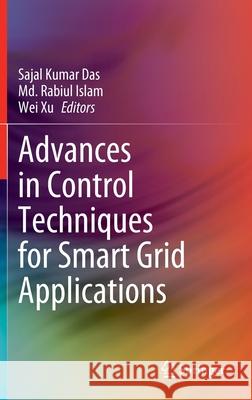Advances in Control Techniques for Smart Grid Applications » książka



Advances in Control Techniques for Smart Grid Applications
ISBN-13: 9789811698552 / Angielski / Twarda / 2022 / 388 str.
Advances in Control Techniques for Smart Grid Applications
ISBN-13: 9789811698552 / Angielski / Twarda / 2022 / 388 str.
(netto: 690,08 VAT: 5%)
Najniższa cena z 30 dni: 693,97
ok. 16-18 dni roboczych.
Darmowa dostawa!
Dr. Sajal K. Das is the Head of the Department of Mechatronics Engineering of Rajshahi University of Engineering & Technology, Bangladesh, and Director of Control System Research Group of RUET. He served as the President of the Robotic Society of RUET and is the Advisor of the Robotics and Automation Society, IEEE RUET SB, Bangladesh. He earned a Ph.D. Degree from the University of New South Wales (UNSW), Australia, and worked as a Research Engineer at the National University of Singapore (NUS), Singapore. He was a Visiting Academic at the University of Newcastle, Australia, and a Faculty Member of the Department of Electrical and Electronic Engineering of American International University-Bangladesh. He is a member of IEEE and serves as the Guest Associate Editor in IET Renewable Power Generation, and Guest Editor in Sustainability, and Energies. His research interest includes robust control and applications, renewable energy generation and control, microgrid, smart grid, virtual power plant, cyber-security, and nano-positioning control. He has published more than 100 peer-reviewed journal and conference papers.
Dr. Md. Rabiul Islam received the Ph.D. degree from University of Technology Sydney (UTS), Sydney, Australia, in 2014 in electrical engineering. Dr Rabiul Islam is a Senior Lecturer at the School of Electrical, Computer, and Telecommunications Engineering (SECTE), University of Wollongong (UOW), Wollongong, Australia. He is a Senior Member of IEEE. His research interests are in the fields of power electronic converters, renewable energy technologies, power quality, electrical machines, electric vehicles, and smart grid. He has authored or co-authored more than 280 papers including 81 IEEE Transactions/IEEE Journal papers. He has written or edited 6 technical books published by Springer and Taylor & Francis. He has received several Best Paper Awards including 2 Best Paper recognitions from the IEEE Transactions on Energy Conversion in 2020. He is serving as an Associate Editor for the IEEE Transactions on Industrial Electronics, IEEE Transactions on Energy Conversion, IEEE Power Engineering Letters, and IEEE Access. He is also editing a special issue entitled “Advances in High-frequency Isolated Power Converters” for the IEEE Journal of Emerging and Selected Topics in Industrial Electronics. He is an Editor of the Book Series entitled “Advanced in Power Electronic Converters” for CRC Press, Taylor & Francis Group. He has received several funding from Government and Industries including in total $5.48 million from Australian Government through Australian Research Council (ARC), e.g. Discovery Project (DP) 2020 entitled “A Next Generation Smart Solid-State Transformer for Power Grid Applications”.
Dr. Wei Xu received the double B.E. and M.E. degrees from Tianjin University, Tianjin, China, in 2002 and 2005, and the Ph.D. from the Institute of Electrical Engineering, Chinese Academy of Sciences, in 2008, respectively, all in electrical engineering. His research topics mainly cover design and control of linear/rotary machines. From 2008 to 2012, he made Postdoctoral Fellow with University of Technology Sydney, Vice Chancellor Research Fellow with Royal Melbourne Institute of Technology, Japan Science Promotion Society Invitation Fellow with Meiji University, respectively. Since 2013, he has been full professor with State Key Laboratory of Advanced Elec-tromagnetic Engineering in Huazhong University of Science and Technology, China. He has more than 110 papers accepted or pub-lished in IEEE Journals, two edited books published by Springer Press, one monograph published by China Machine Press, and more than 150 Invention Patents granted or in pending, all in the related fields of electrical machines and drives. He is Fellow of the Institute of Engineering and Technology (IET). He is the General Chair for 2021 International Symposium on Linear Drives for Industry Applications (LDIA 2021) and 2023 IEEE International Conference on Predictive Control of Electrical Drives and Power Electronics (PRECEDE 2023) in Wuhan, China, respectively. He has served as Associate Editor for several leading IEEE Transactions Journals, such as IEEE Transactions on Industrial Electronics, IEEE Transactions on Vehicular Technology, IEEE Transactions on Energy Conversion, and so on.
To meet the increasing demand of electrical power, the use of renewable energy-based smart grid is attracting significant attention in recent years throughout the world. The high penetration of renewable power in the smart grids is growing its importance due to its non-finishing, reusable, reliable, sustainable, lower cost, and available characteristics. The renewable energy-based smart grid technology may mitigate the increasing energy demands effectively and efficiently without hampering the environment. But the uncertain nature of renewable sources largely affects the operation of the smart grid by un-stabling the voltage and frequency that may introduces power quality and reliability problems, which requires special control techniques. This book investigates the challenges in controlling renewable energy-based smart grids and proposes different control techniques to control the voltage and frequency effectively to improve the power quality and reliability of the power grids. This book is a valuable resource for readers interested in practical solutions in smart grids and renewable energy systems.
1997-2026 DolnySlask.com Agencja Internetowa
KrainaKsiazek.PL - Księgarnia Internetowa









